CBT Interventions for Anxiety and Depression in Dementia Caregivers
VerifiedAdded on 2023/01/05
|23
|8269
|71
Report
AI Summary
This report delves into the experiences of family caregivers grappling with anxiety and depression while caring for loved ones with dementia. The focus is on the application and effectiveness of Cognitive Behavioral Therapy (CBT) in alleviating these mental health challenges, rather than directly treating dementia itself. The research involved a thorough literature review, employing various methodologies to analyze published research papers and articles. The study aims to improve the symptoms experienced by family caregivers by providing them with effective strategies to manage their anxiety and depression. The data analysis, conducted through thematic analysis, yielded interpretations that contribute to the research objectives. The report explores the impact of anxiety and depression on family caregivers, the challenges in identifying these issues, the rationale for using CBT, and the significance of CBT in addressing specific aspects of caregiver distress. The findings underscore the importance of mental health support for those caring for individuals with dementia, offering valuable insights for healthcare professionals and caregivers alike. Strengths and limitations are discussed, and the report concludes with suggestions for dissemination and implications for practice.
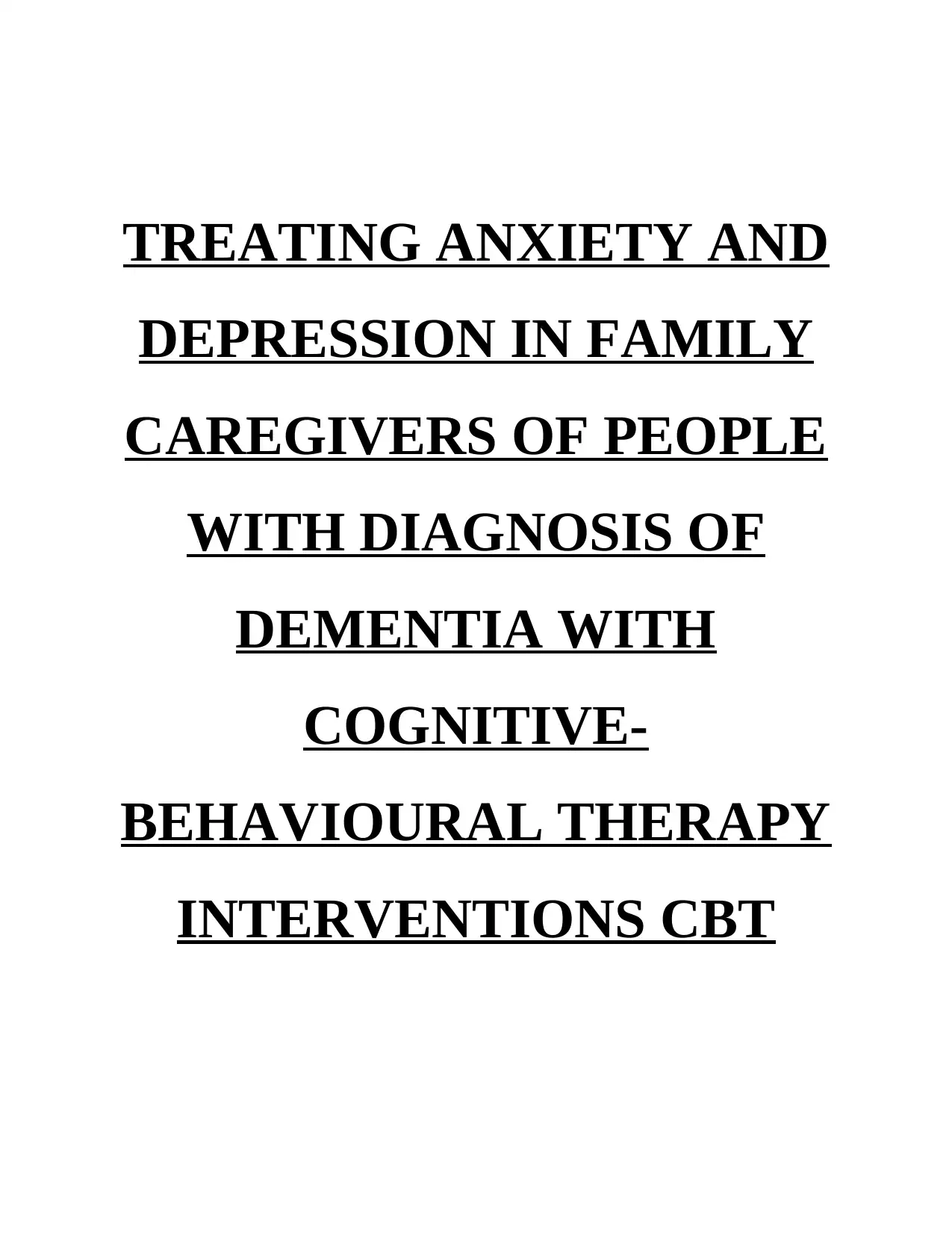
TREATING ANXIETY AND
DEPRESSION IN FAMILY
CAREGIVERS OF PEOPLE
WITH DIAGNOSIS OF
DEMENTIA WITH
COGNITIVE-
BEHAVIOURAL THERAPY
INTERVENTIONS CBT
DEPRESSION IN FAMILY
CAREGIVERS OF PEOPLE
WITH DIAGNOSIS OF
DEMENTIA WITH
COGNITIVE-
BEHAVIOURAL THERAPY
INTERVENTIONS CBT
Paraphrase This Document
Need a fresh take? Get an instant paraphrase of this document with our AI Paraphraser
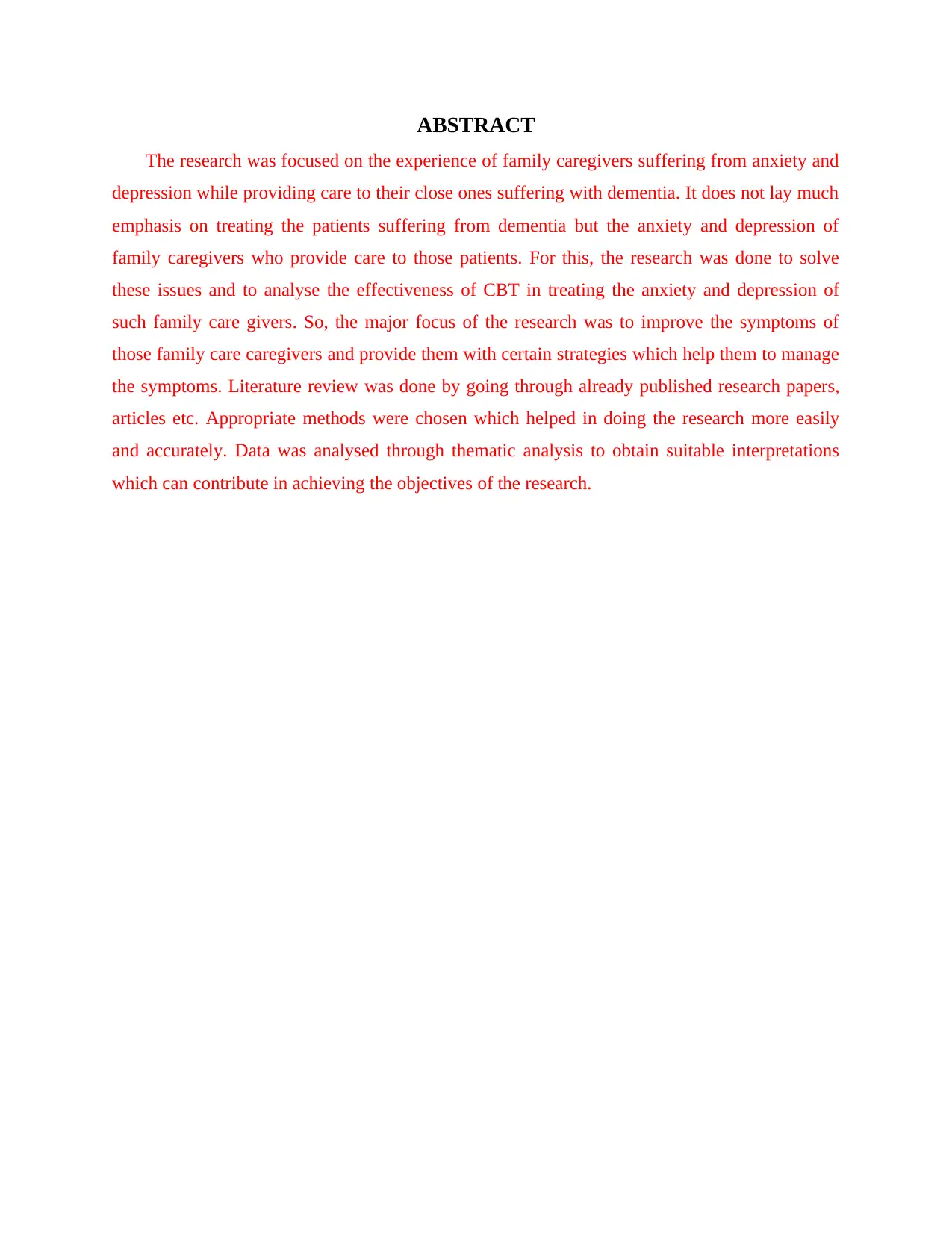
ABSTRACT
The research was focused on the experience of family caregivers suffering from anxiety and
depression while providing care to their close ones suffering with dementia. It does not lay much
emphasis on treating the patients suffering from dementia but the anxiety and depression of
family caregivers who provide care to those patients. For this, the research was done to solve
these issues and to analyse the effectiveness of CBT in treating the anxiety and depression of
such family care givers. So, the major focus of the research was to improve the symptoms of
those family care caregivers and provide them with certain strategies which help them to manage
the symptoms. Literature review was done by going through already published research papers,
articles etc. Appropriate methods were chosen which helped in doing the research more easily
and accurately. Data was analysed through thematic analysis to obtain suitable interpretations
which can contribute in achieving the objectives of the research.
The research was focused on the experience of family caregivers suffering from anxiety and
depression while providing care to their close ones suffering with dementia. It does not lay much
emphasis on treating the patients suffering from dementia but the anxiety and depression of
family caregivers who provide care to those patients. For this, the research was done to solve
these issues and to analyse the effectiveness of CBT in treating the anxiety and depression of
such family care givers. So, the major focus of the research was to improve the symptoms of
those family care caregivers and provide them with certain strategies which help them to manage
the symptoms. Literature review was done by going through already published research papers,
articles etc. Appropriate methods were chosen which helped in doing the research more easily
and accurately. Data was analysed through thematic analysis to obtain suitable interpretations
which can contribute in achieving the objectives of the research.
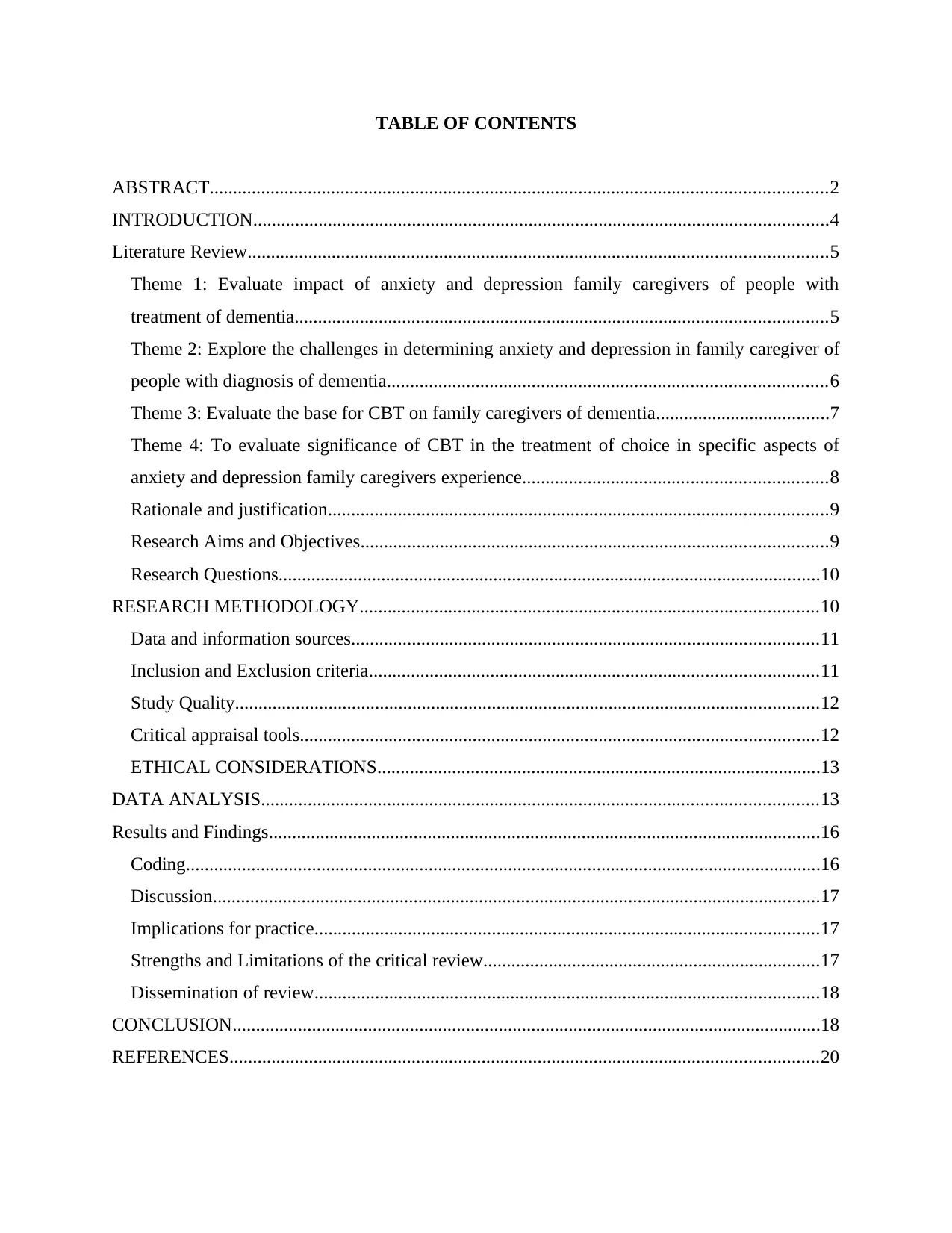
TABLE OF CONTENTS
ABSTRACT....................................................................................................................................2
INTRODUCTION...........................................................................................................................4
Literature Review............................................................................................................................5
Theme 1: Evaluate impact of anxiety and depression family caregivers of people with
treatment of dementia..................................................................................................................5
Theme 2: Explore the challenges in determining anxiety and depression in family caregiver of
people with diagnosis of dementia..............................................................................................6
Theme 3: Evaluate the base for CBT on family caregivers of dementia.....................................7
Theme 4: To evaluate significance of CBT in the treatment of choice in specific aspects of
anxiety and depression family caregivers experience.................................................................8
Rationale and justification...........................................................................................................9
Research Aims and Objectives....................................................................................................9
Research Questions....................................................................................................................10
RESEARCH METHODOLOGY..................................................................................................10
Data and information sources....................................................................................................11
Inclusion and Exclusion criteria................................................................................................11
Study Quality.............................................................................................................................12
Critical appraisal tools...............................................................................................................12
ETHICAL CONSIDERATIONS...............................................................................................13
DATA ANALYSIS.......................................................................................................................13
Results and Findings......................................................................................................................16
Coding........................................................................................................................................16
Discussion..................................................................................................................................17
Implications for practice............................................................................................................17
Strengths and Limitations of the critical review........................................................................17
Dissemination of review............................................................................................................18
CONCLUSION..............................................................................................................................18
REFERENCES..............................................................................................................................20
ABSTRACT....................................................................................................................................2
INTRODUCTION...........................................................................................................................4
Literature Review............................................................................................................................5
Theme 1: Evaluate impact of anxiety and depression family caregivers of people with
treatment of dementia..................................................................................................................5
Theme 2: Explore the challenges in determining anxiety and depression in family caregiver of
people with diagnosis of dementia..............................................................................................6
Theme 3: Evaluate the base for CBT on family caregivers of dementia.....................................7
Theme 4: To evaluate significance of CBT in the treatment of choice in specific aspects of
anxiety and depression family caregivers experience.................................................................8
Rationale and justification...........................................................................................................9
Research Aims and Objectives....................................................................................................9
Research Questions....................................................................................................................10
RESEARCH METHODOLOGY..................................................................................................10
Data and information sources....................................................................................................11
Inclusion and Exclusion criteria................................................................................................11
Study Quality.............................................................................................................................12
Critical appraisal tools...............................................................................................................12
ETHICAL CONSIDERATIONS...............................................................................................13
DATA ANALYSIS.......................................................................................................................13
Results and Findings......................................................................................................................16
Coding........................................................................................................................................16
Discussion..................................................................................................................................17
Implications for practice............................................................................................................17
Strengths and Limitations of the critical review........................................................................17
Dissemination of review............................................................................................................18
CONCLUSION..............................................................................................................................18
REFERENCES..............................................................................................................................20
⊘ This is a preview!⊘
Do you want full access?
Subscribe today to unlock all pages.

Trusted by 1+ million students worldwide
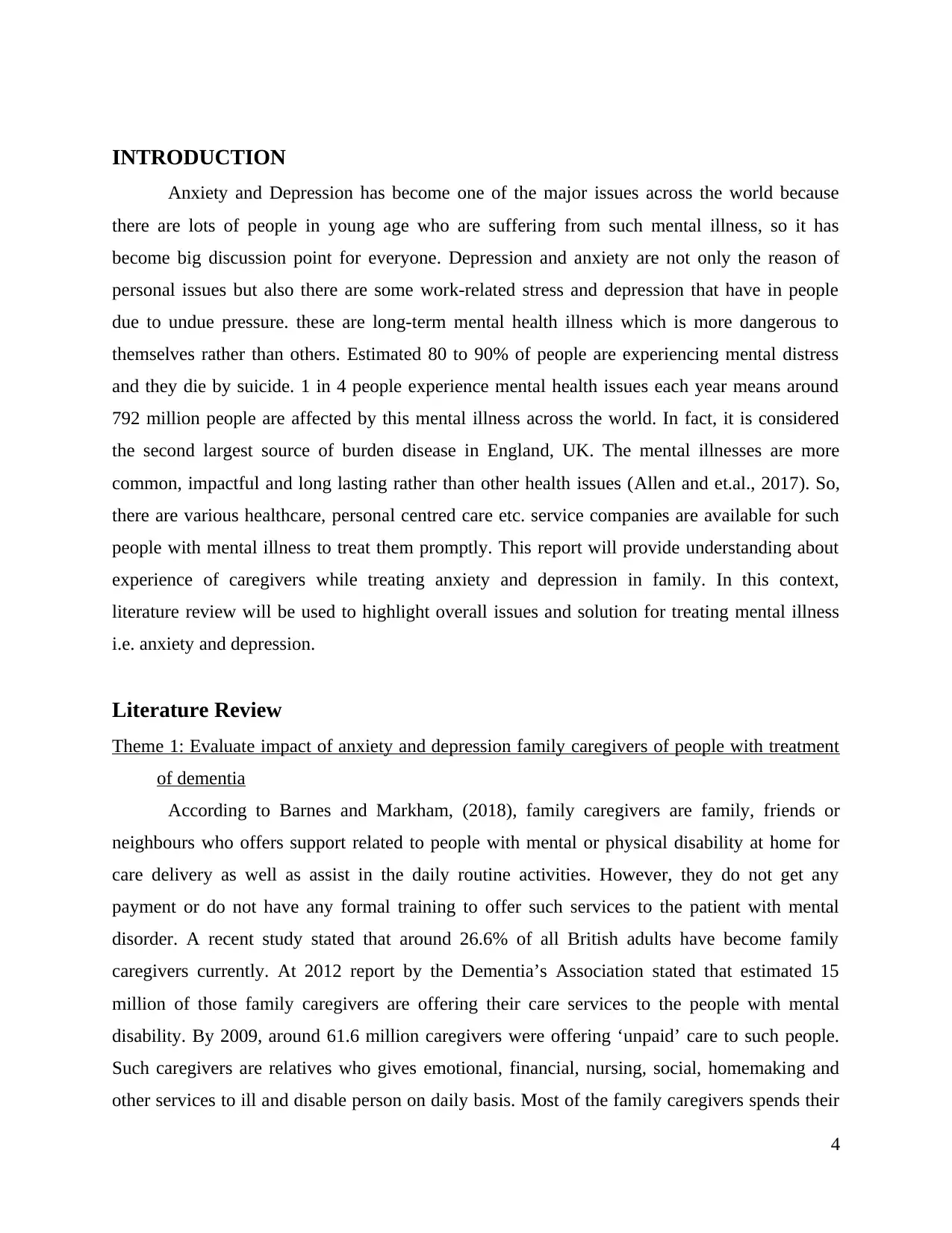
INTRODUCTION
Anxiety and Depression has become one of the major issues across the world because
there are lots of people in young age who are suffering from such mental illness, so it has
become big discussion point for everyone. Depression and anxiety are not only the reason of
personal issues but also there are some work-related stress and depression that have in people
due to undue pressure. these are long-term mental health illness which is more dangerous to
themselves rather than others. Estimated 80 to 90% of people are experiencing mental distress
and they die by suicide. 1 in 4 people experience mental health issues each year means around
792 million people are affected by this mental illness across the world. In fact, it is considered
the second largest source of burden disease in England, UK. The mental illnesses are more
common, impactful and long lasting rather than other health issues (Allen and et.al., 2017). So,
there are various healthcare, personal centred care etc. service companies are available for such
people with mental illness to treat them promptly. This report will provide understanding about
experience of caregivers while treating anxiety and depression in family. In this context,
literature review will be used to highlight overall issues and solution for treating mental illness
i.e. anxiety and depression.
Literature Review
Theme 1: Evaluate impact of anxiety and depression family caregivers of people with treatment
of dementia
According to Barnes and Markham, (2018), family caregivers are family, friends or
neighbours who offers support related to people with mental or physical disability at home for
care delivery as well as assist in the daily routine activities. However, they do not get any
payment or do not have any formal training to offer such services to the patient with mental
disorder. A recent study stated that around 26.6% of all British adults have become family
caregivers currently. At 2012 report by the Dementia’s Association stated that estimated 15
million of those family caregivers are offering their care services to the people with mental
disability. By 2009, around 61.6 million caregivers were offering ‘unpaid’ care to such people.
Such caregivers are relatives who gives emotional, financial, nursing, social, homemaking and
other services to ill and disable person on daily basis. Most of the family caregivers spends their
4
Anxiety and Depression has become one of the major issues across the world because
there are lots of people in young age who are suffering from such mental illness, so it has
become big discussion point for everyone. Depression and anxiety are not only the reason of
personal issues but also there are some work-related stress and depression that have in people
due to undue pressure. these are long-term mental health illness which is more dangerous to
themselves rather than others. Estimated 80 to 90% of people are experiencing mental distress
and they die by suicide. 1 in 4 people experience mental health issues each year means around
792 million people are affected by this mental illness across the world. In fact, it is considered
the second largest source of burden disease in England, UK. The mental illnesses are more
common, impactful and long lasting rather than other health issues (Allen and et.al., 2017). So,
there are various healthcare, personal centred care etc. service companies are available for such
people with mental illness to treat them promptly. This report will provide understanding about
experience of caregivers while treating anxiety and depression in family. In this context,
literature review will be used to highlight overall issues and solution for treating mental illness
i.e. anxiety and depression.
Literature Review
Theme 1: Evaluate impact of anxiety and depression family caregivers of people with treatment
of dementia
According to Barnes and Markham, (2018), family caregivers are family, friends or
neighbours who offers support related to people with mental or physical disability at home for
care delivery as well as assist in the daily routine activities. However, they do not get any
payment or do not have any formal training to offer such services to the patient with mental
disorder. A recent study stated that around 26.6% of all British adults have become family
caregivers currently. At 2012 report by the Dementia’s Association stated that estimated 15
million of those family caregivers are offering their care services to the people with mental
disability. By 2009, around 61.6 million caregivers were offering ‘unpaid’ care to such people.
Such caregivers are relatives who gives emotional, financial, nursing, social, homemaking and
other services to ill and disable person on daily basis. Most of the family caregivers spends their
4
Paraphrase This Document
Need a fresh take? Get an instant paraphrase of this document with our AI Paraphraser
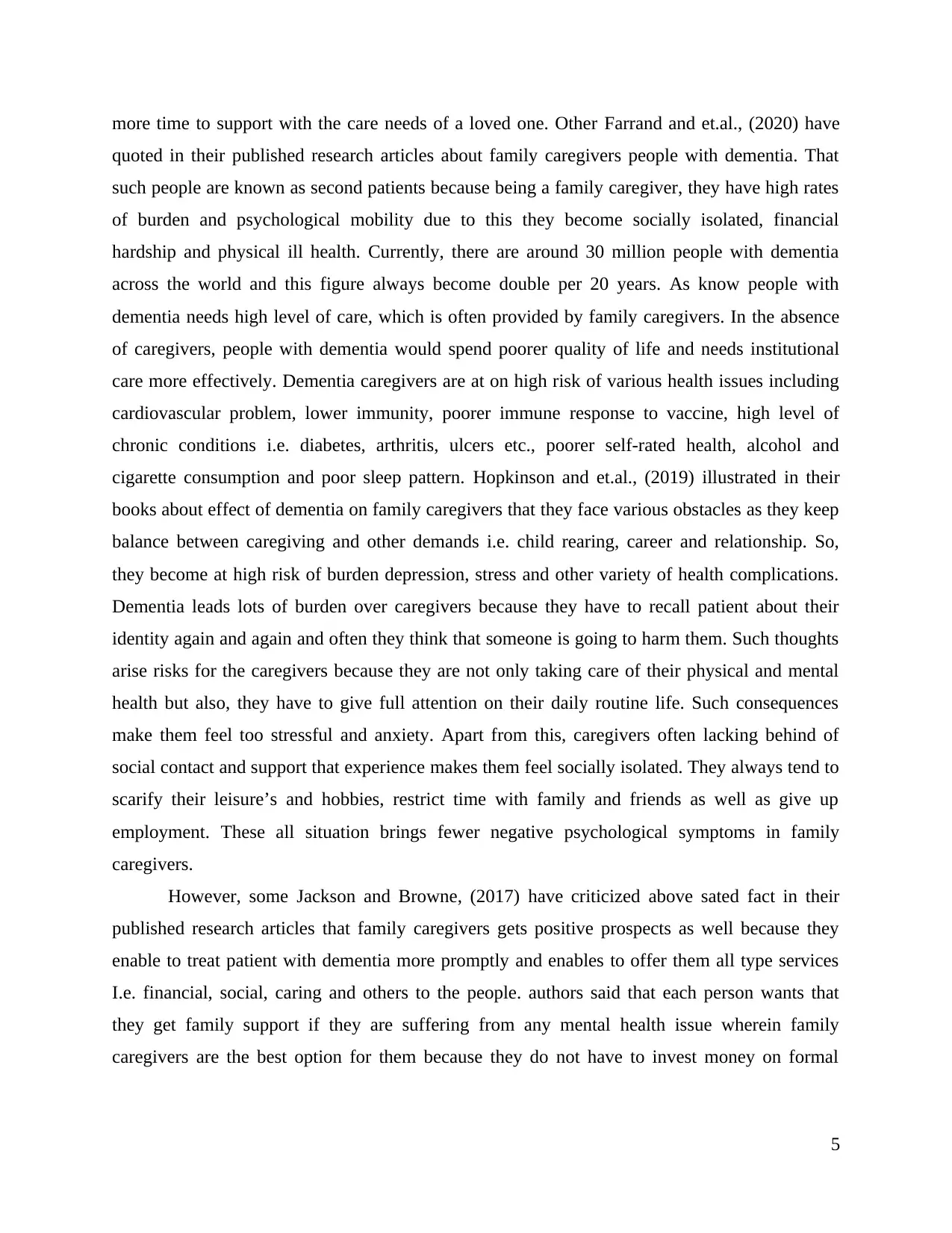
more time to support with the care needs of a loved one. Other Farrand and et.al., (2020) have
quoted in their published research articles about family caregivers people with dementia. That
such people are known as second patients because being a family caregiver, they have high rates
of burden and psychological mobility due to this they become socially isolated, financial
hardship and physical ill health. Currently, there are around 30 million people with dementia
across the world and this figure always become double per 20 years. As know people with
dementia needs high level of care, which is often provided by family caregivers. In the absence
of caregivers, people with dementia would spend poorer quality of life and needs institutional
care more effectively. Dementia caregivers are at on high risk of various health issues including
cardiovascular problem, lower immunity, poorer immune response to vaccine, high level of
chronic conditions i.e. diabetes, arthritis, ulcers etc., poorer self-rated health, alcohol and
cigarette consumption and poor sleep pattern. Hopkinson and et.al., (2019) illustrated in their
books about effect of dementia on family caregivers that they face various obstacles as they keep
balance between caregiving and other demands i.e. child rearing, career and relationship. So,
they become at high risk of burden depression, stress and other variety of health complications.
Dementia leads lots of burden over caregivers because they have to recall patient about their
identity again and again and often they think that someone is going to harm them. Such thoughts
arise risks for the caregivers because they are not only taking care of their physical and mental
health but also, they have to give full attention on their daily routine life. Such consequences
make them feel too stressful and anxiety. Apart from this, caregivers often lacking behind of
social contact and support that experience makes them feel socially isolated. They always tend to
scarify their leisure’s and hobbies, restrict time with family and friends as well as give up
employment. These all situation brings fewer negative psychological symptoms in family
caregivers.
However, some Jackson and Browne, (2017) have criticized above sated fact in their
published research articles that family caregivers gets positive prospects as well because they
enable to treat patient with dementia more promptly and enables to offer them all type services
I.e. financial, social, caring and others to the people. authors said that each person wants that
they get family support if they are suffering from any mental health issue wherein family
caregivers are the best option for them because they do not have to invest money on formal
5
quoted in their published research articles about family caregivers people with dementia. That
such people are known as second patients because being a family caregiver, they have high rates
of burden and psychological mobility due to this they become socially isolated, financial
hardship and physical ill health. Currently, there are around 30 million people with dementia
across the world and this figure always become double per 20 years. As know people with
dementia needs high level of care, which is often provided by family caregivers. In the absence
of caregivers, people with dementia would spend poorer quality of life and needs institutional
care more effectively. Dementia caregivers are at on high risk of various health issues including
cardiovascular problem, lower immunity, poorer immune response to vaccine, high level of
chronic conditions i.e. diabetes, arthritis, ulcers etc., poorer self-rated health, alcohol and
cigarette consumption and poor sleep pattern. Hopkinson and et.al., (2019) illustrated in their
books about effect of dementia on family caregivers that they face various obstacles as they keep
balance between caregiving and other demands i.e. child rearing, career and relationship. So,
they become at high risk of burden depression, stress and other variety of health complications.
Dementia leads lots of burden over caregivers because they have to recall patient about their
identity again and again and often they think that someone is going to harm them. Such thoughts
arise risks for the caregivers because they are not only taking care of their physical and mental
health but also, they have to give full attention on their daily routine life. Such consequences
make them feel too stressful and anxiety. Apart from this, caregivers often lacking behind of
social contact and support that experience makes them feel socially isolated. They always tend to
scarify their leisure’s and hobbies, restrict time with family and friends as well as give up
employment. These all situation brings fewer negative psychological symptoms in family
caregivers.
However, some Jackson and Browne, (2017) have criticized above sated fact in their
published research articles that family caregivers gets positive prospects as well because they
enable to treat patient with dementia more promptly and enables to offer them all type services
I.e. financial, social, caring and others to the people. authors said that each person wants that
they get family support if they are suffering from any mental health issue wherein family
caregivers are the best option for them because they do not have to invest money on formal
5
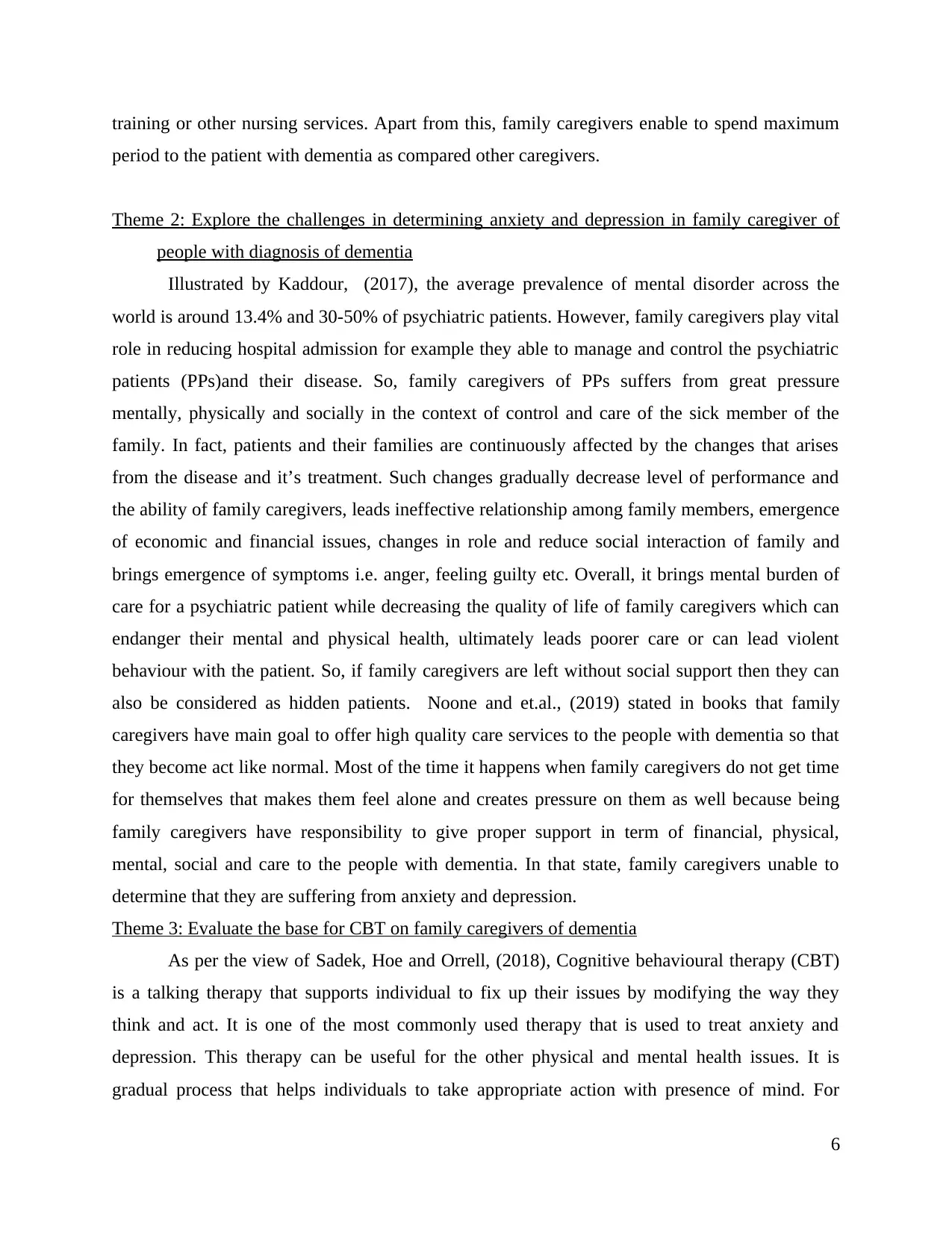
training or other nursing services. Apart from this, family caregivers enable to spend maximum
period to the patient with dementia as compared other caregivers.
Theme 2: Explore the challenges in determining anxiety and depression in family caregiver of
people with diagnosis of dementia
Illustrated by Kaddour, (2017), the average prevalence of mental disorder across the
world is around 13.4% and 30-50% of psychiatric patients. However, family caregivers play vital
role in reducing hospital admission for example they able to manage and control the psychiatric
patients (PPs)and their disease. So, family caregivers of PPs suffers from great pressure
mentally, physically and socially in the context of control and care of the sick member of the
family. In fact, patients and their families are continuously affected by the changes that arises
from the disease and it’s treatment. Such changes gradually decrease level of performance and
the ability of family caregivers, leads ineffective relationship among family members, emergence
of economic and financial issues, changes in role and reduce social interaction of family and
brings emergence of symptoms i.e. anger, feeling guilty etc. Overall, it brings mental burden of
care for a psychiatric patient while decreasing the quality of life of family caregivers which can
endanger their mental and physical health, ultimately leads poorer care or can lead violent
behaviour with the patient. So, if family caregivers are left without social support then they can
also be considered as hidden patients. Noone and et.al., (2019) stated in books that family
caregivers have main goal to offer high quality care services to the people with dementia so that
they become act like normal. Most of the time it happens when family caregivers do not get time
for themselves that makes them feel alone and creates pressure on them as well because being
family caregivers have responsibility to give proper support in term of financial, physical,
mental, social and care to the people with dementia. In that state, family caregivers unable to
determine that they are suffering from anxiety and depression.
Theme 3: Evaluate the base for CBT on family caregivers of dementia
As per the view of Sadek, Hoe and Orrell, (2018), Cognitive behavioural therapy (CBT)
is a talking therapy that supports individual to fix up their issues by modifying the way they
think and act. It is one of the most commonly used therapy that is used to treat anxiety and
depression. This therapy can be useful for the other physical and mental health issues. It is
gradual process that helps individuals to take appropriate action with presence of mind. For
6
period to the patient with dementia as compared other caregivers.
Theme 2: Explore the challenges in determining anxiety and depression in family caregiver of
people with diagnosis of dementia
Illustrated by Kaddour, (2017), the average prevalence of mental disorder across the
world is around 13.4% and 30-50% of psychiatric patients. However, family caregivers play vital
role in reducing hospital admission for example they able to manage and control the psychiatric
patients (PPs)and their disease. So, family caregivers of PPs suffers from great pressure
mentally, physically and socially in the context of control and care of the sick member of the
family. In fact, patients and their families are continuously affected by the changes that arises
from the disease and it’s treatment. Such changes gradually decrease level of performance and
the ability of family caregivers, leads ineffective relationship among family members, emergence
of economic and financial issues, changes in role and reduce social interaction of family and
brings emergence of symptoms i.e. anger, feeling guilty etc. Overall, it brings mental burden of
care for a psychiatric patient while decreasing the quality of life of family caregivers which can
endanger their mental and physical health, ultimately leads poorer care or can lead violent
behaviour with the patient. So, if family caregivers are left without social support then they can
also be considered as hidden patients. Noone and et.al., (2019) stated in books that family
caregivers have main goal to offer high quality care services to the people with dementia so that
they become act like normal. Most of the time it happens when family caregivers do not get time
for themselves that makes them feel alone and creates pressure on them as well because being
family caregivers have responsibility to give proper support in term of financial, physical,
mental, social and care to the people with dementia. In that state, family caregivers unable to
determine that they are suffering from anxiety and depression.
Theme 3: Evaluate the base for CBT on family caregivers of dementia
As per the view of Sadek, Hoe and Orrell, (2018), Cognitive behavioural therapy (CBT)
is a talking therapy that supports individual to fix up their issues by modifying the way they
think and act. It is one of the most commonly used therapy that is used to treat anxiety and
depression. This therapy can be useful for the other physical and mental health issues. It is
gradual process that helps individuals to take appropriate action with presence of mind. For
6
⊘ This is a preview!⊘
Do you want full access?
Subscribe today to unlock all pages.

Trusted by 1+ million students worldwide
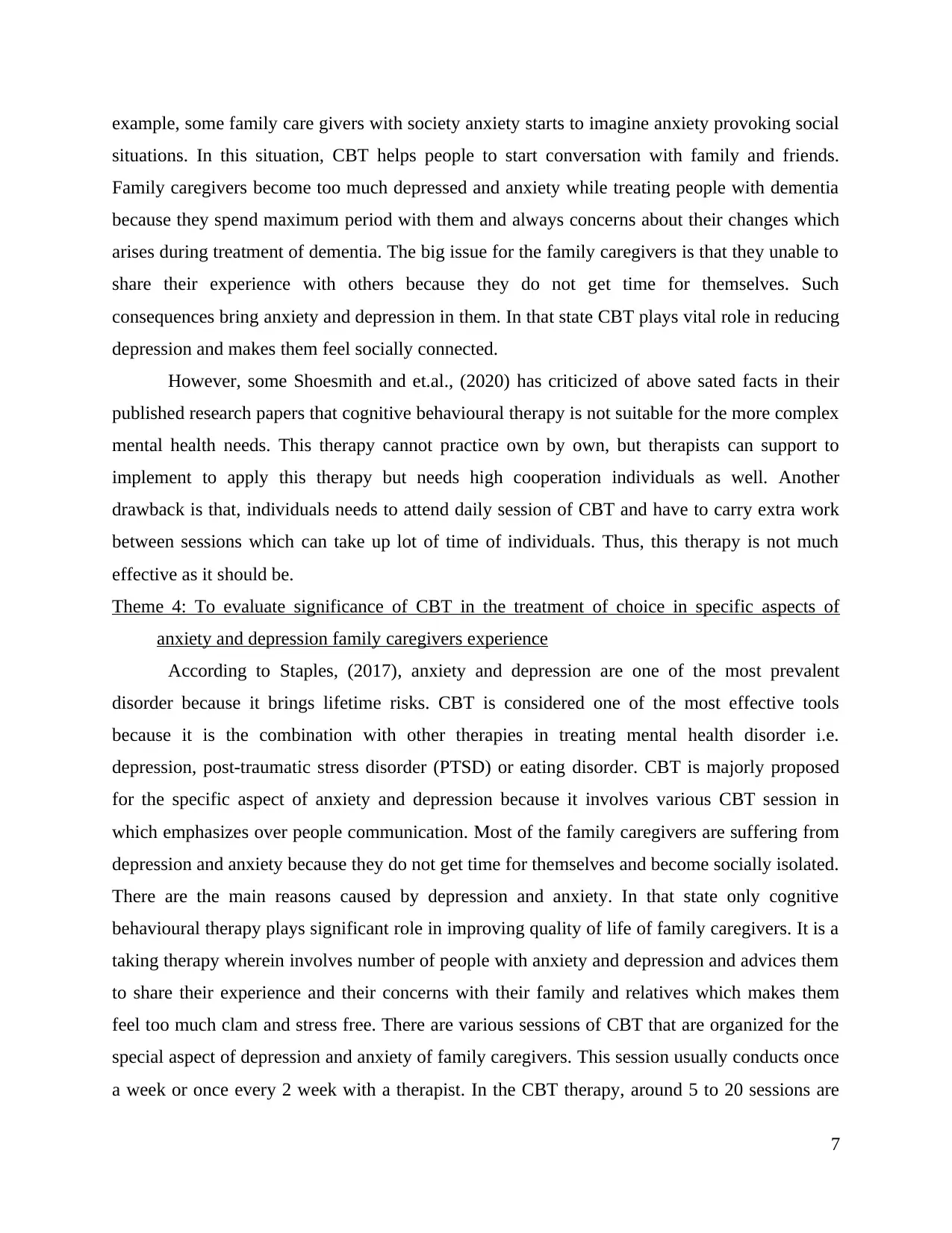
example, some family care givers with society anxiety starts to imagine anxiety provoking social
situations. In this situation, CBT helps people to start conversation with family and friends.
Family caregivers become too much depressed and anxiety while treating people with dementia
because they spend maximum period with them and always concerns about their changes which
arises during treatment of dementia. The big issue for the family caregivers is that they unable to
share their experience with others because they do not get time for themselves. Such
consequences bring anxiety and depression in them. In that state CBT plays vital role in reducing
depression and makes them feel socially connected.
However, some Shoesmith and et.al., (2020) has criticized of above sated facts in their
published research papers that cognitive behavioural therapy is not suitable for the more complex
mental health needs. This therapy cannot practice own by own, but therapists can support to
implement to apply this therapy but needs high cooperation individuals as well. Another
drawback is that, individuals needs to attend daily session of CBT and have to carry extra work
between sessions which can take up lot of time of individuals. Thus, this therapy is not much
effective as it should be.
Theme 4: To evaluate significance of CBT in the treatment of choice in specific aspects of
anxiety and depression family caregivers experience
According to Staples, (2017), anxiety and depression are one of the most prevalent
disorder because it brings lifetime risks. CBT is considered one of the most effective tools
because it is the combination with other therapies in treating mental health disorder i.e.
depression, post-traumatic stress disorder (PTSD) or eating disorder. CBT is majorly proposed
for the specific aspect of anxiety and depression because it involves various CBT session in
which emphasizes over people communication. Most of the family caregivers are suffering from
depression and anxiety because they do not get time for themselves and become socially isolated.
There are the main reasons caused by depression and anxiety. In that state only cognitive
behavioural therapy plays significant role in improving quality of life of family caregivers. It is a
taking therapy wherein involves number of people with anxiety and depression and advices them
to share their experience and their concerns with their family and relatives which makes them
feel too much clam and stress free. There are various sessions of CBT that are organized for the
special aspect of depression and anxiety of family caregivers. This session usually conducts once
a week or once every 2 week with a therapist. In the CBT therapy, around 5 to 20 sessions are
7
situations. In this situation, CBT helps people to start conversation with family and friends.
Family caregivers become too much depressed and anxiety while treating people with dementia
because they spend maximum period with them and always concerns about their changes which
arises during treatment of dementia. The big issue for the family caregivers is that they unable to
share their experience with others because they do not get time for themselves. Such
consequences bring anxiety and depression in them. In that state CBT plays vital role in reducing
depression and makes them feel socially connected.
However, some Shoesmith and et.al., (2020) has criticized of above sated facts in their
published research papers that cognitive behavioural therapy is not suitable for the more complex
mental health needs. This therapy cannot practice own by own, but therapists can support to
implement to apply this therapy but needs high cooperation individuals as well. Another
drawback is that, individuals needs to attend daily session of CBT and have to carry extra work
between sessions which can take up lot of time of individuals. Thus, this therapy is not much
effective as it should be.
Theme 4: To evaluate significance of CBT in the treatment of choice in specific aspects of
anxiety and depression family caregivers experience
According to Staples, (2017), anxiety and depression are one of the most prevalent
disorder because it brings lifetime risks. CBT is considered one of the most effective tools
because it is the combination with other therapies in treating mental health disorder i.e.
depression, post-traumatic stress disorder (PTSD) or eating disorder. CBT is majorly proposed
for the specific aspect of anxiety and depression because it involves various CBT session in
which emphasizes over people communication. Most of the family caregivers are suffering from
depression and anxiety because they do not get time for themselves and become socially isolated.
There are the main reasons caused by depression and anxiety. In that state only cognitive
behavioural therapy plays significant role in improving quality of life of family caregivers. It is a
taking therapy wherein involves number of people with anxiety and depression and advices them
to share their experience and their concerns with their family and relatives which makes them
feel too much clam and stress free. There are various sessions of CBT that are organized for the
special aspect of depression and anxiety of family caregivers. This session usually conducts once
a week or once every 2 week with a therapist. In the CBT therapy, around 5 to 20 sessions are
7
Paraphrase This Document
Need a fresh take? Get an instant paraphrase of this document with our AI Paraphraser
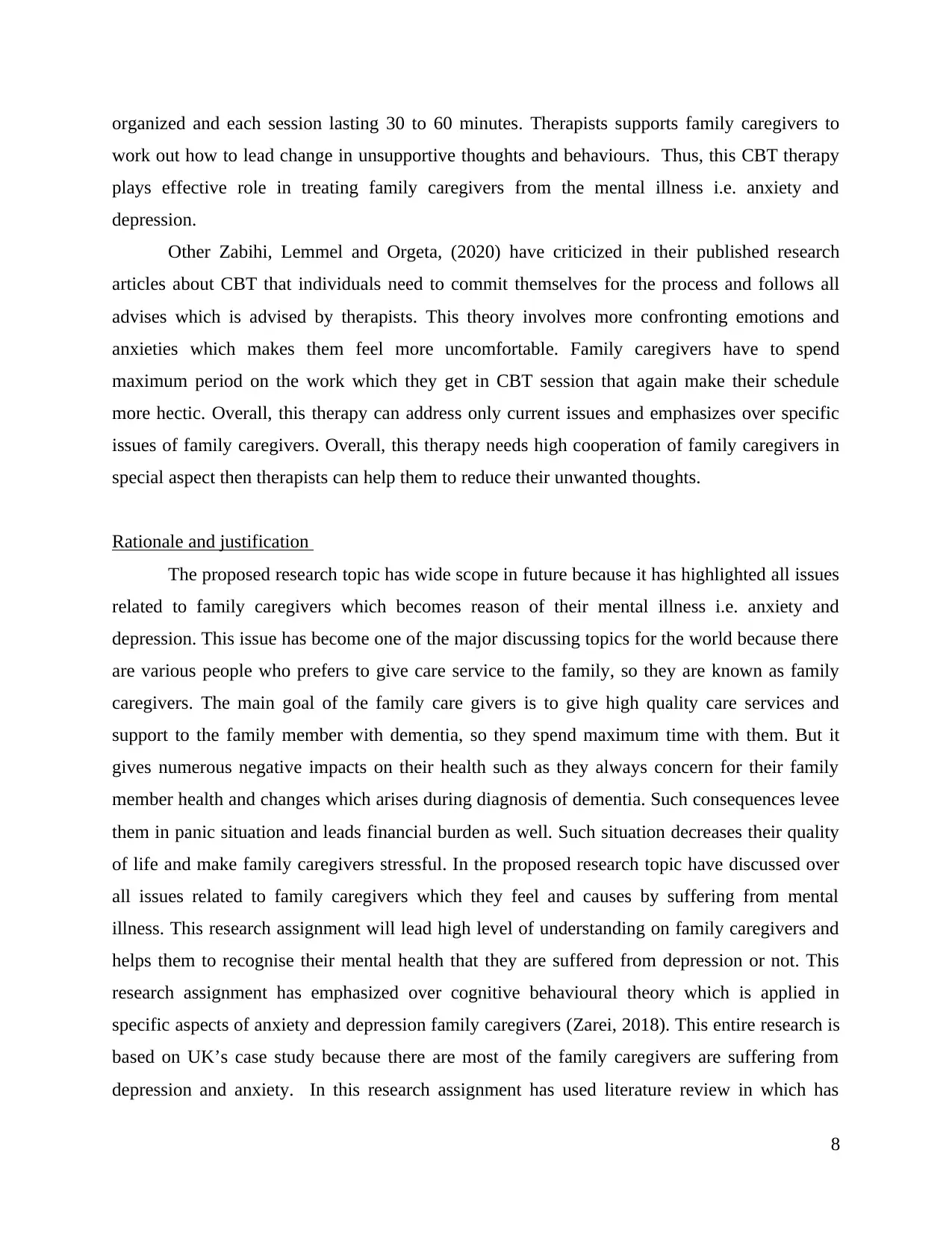
organized and each session lasting 30 to 60 minutes. Therapists supports family caregivers to
work out how to lead change in unsupportive thoughts and behaviours. Thus, this CBT therapy
plays effective role in treating family caregivers from the mental illness i.e. anxiety and
depression.
Other Zabihi, Lemmel and Orgeta, (2020) have criticized in their published research
articles about CBT that individuals need to commit themselves for the process and follows all
advises which is advised by therapists. This theory involves more confronting emotions and
anxieties which makes them feel more uncomfortable. Family caregivers have to spend
maximum period on the work which they get in CBT session that again make their schedule
more hectic. Overall, this therapy can address only current issues and emphasizes over specific
issues of family caregivers. Overall, this therapy needs high cooperation of family caregivers in
special aspect then therapists can help them to reduce their unwanted thoughts.
Rationale and justification
The proposed research topic has wide scope in future because it has highlighted all issues
related to family caregivers which becomes reason of their mental illness i.e. anxiety and
depression. This issue has become one of the major discussing topics for the world because there
are various people who prefers to give care service to the family, so they are known as family
caregivers. The main goal of the family care givers is to give high quality care services and
support to the family member with dementia, so they spend maximum time with them. But it
gives numerous negative impacts on their health such as they always concern for their family
member health and changes which arises during diagnosis of dementia. Such consequences levee
them in panic situation and leads financial burden as well. Such situation decreases their quality
of life and make family caregivers stressful. In the proposed research topic have discussed over
all issues related to family caregivers which they feel and causes by suffering from mental
illness. This research assignment will lead high level of understanding on family caregivers and
helps them to recognise their mental health that they are suffered from depression or not. This
research assignment has emphasized over cognitive behavioural theory which is applied in
specific aspects of anxiety and depression family caregivers (Zarei, 2018). This entire research is
based on UK’s case study because there are most of the family caregivers are suffering from
depression and anxiety. In this research assignment has used literature review in which has
8
work out how to lead change in unsupportive thoughts and behaviours. Thus, this CBT therapy
plays effective role in treating family caregivers from the mental illness i.e. anxiety and
depression.
Other Zabihi, Lemmel and Orgeta, (2020) have criticized in their published research
articles about CBT that individuals need to commit themselves for the process and follows all
advises which is advised by therapists. This theory involves more confronting emotions and
anxieties which makes them feel more uncomfortable. Family caregivers have to spend
maximum period on the work which they get in CBT session that again make their schedule
more hectic. Overall, this therapy can address only current issues and emphasizes over specific
issues of family caregivers. Overall, this therapy needs high cooperation of family caregivers in
special aspect then therapists can help them to reduce their unwanted thoughts.
Rationale and justification
The proposed research topic has wide scope in future because it has highlighted all issues
related to family caregivers which becomes reason of their mental illness i.e. anxiety and
depression. This issue has become one of the major discussing topics for the world because there
are various people who prefers to give care service to the family, so they are known as family
caregivers. The main goal of the family care givers is to give high quality care services and
support to the family member with dementia, so they spend maximum time with them. But it
gives numerous negative impacts on their health such as they always concern for their family
member health and changes which arises during diagnosis of dementia. Such consequences levee
them in panic situation and leads financial burden as well. Such situation decreases their quality
of life and make family caregivers stressful. In the proposed research topic have discussed over
all issues related to family caregivers which they feel and causes by suffering from mental
illness. This research assignment will lead high level of understanding on family caregivers and
helps them to recognise their mental health that they are suffered from depression or not. This
research assignment has emphasized over cognitive behavioural theory which is applied in
specific aspects of anxiety and depression family caregivers (Zarei, 2018). This entire research is
based on UK’s case study because there are most of the family caregivers are suffering from
depression and anxiety. In this research assignment has used literature review in which has
8
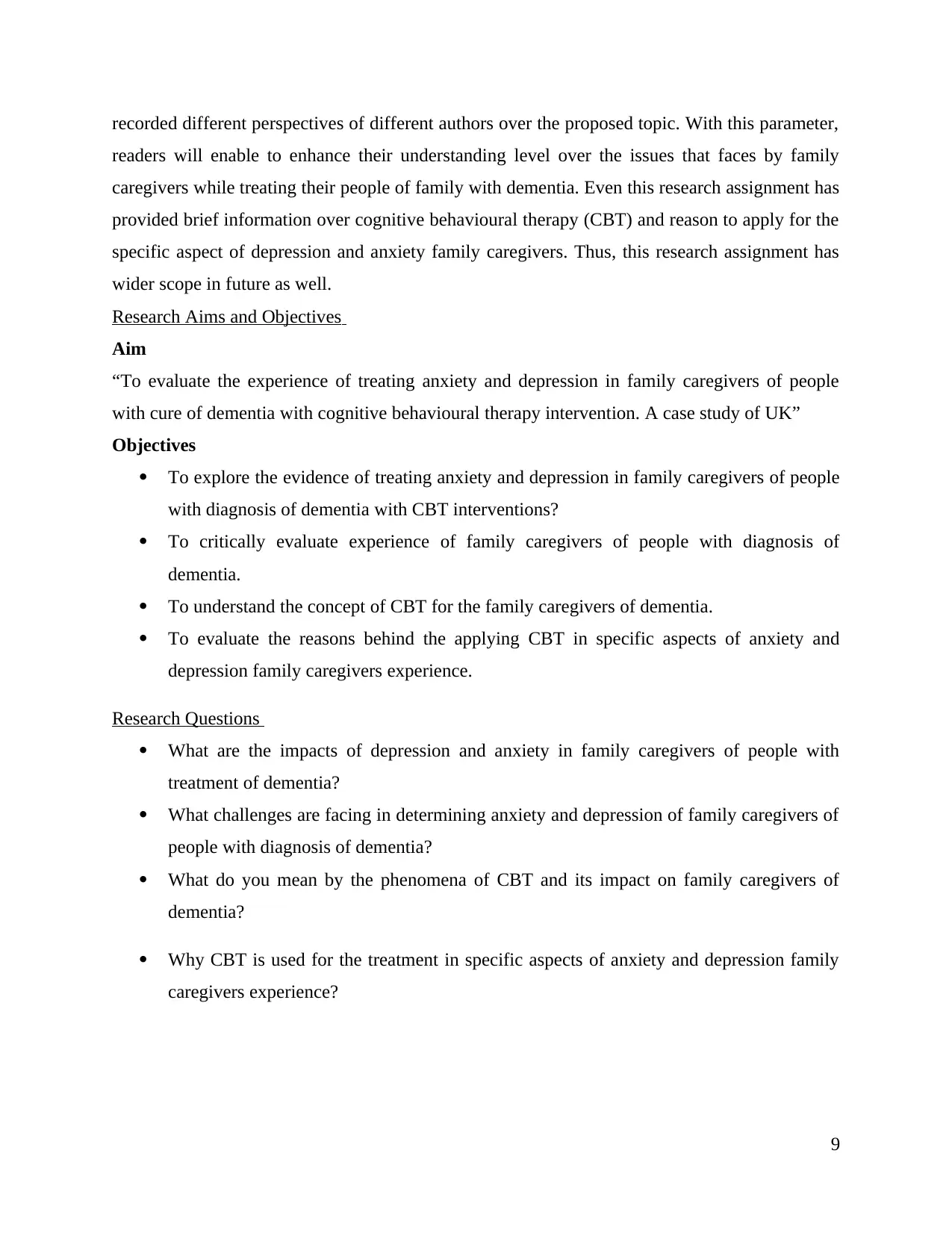
recorded different perspectives of different authors over the proposed topic. With this parameter,
readers will enable to enhance their understanding level over the issues that faces by family
caregivers while treating their people of family with dementia. Even this research assignment has
provided brief information over cognitive behavioural therapy (CBT) and reason to apply for the
specific aspect of depression and anxiety family caregivers. Thus, this research assignment has
wider scope in future as well.
Research Aims and Objectives
Aim
“To evaluate the experience of treating anxiety and depression in family caregivers of people
with cure of dementia with cognitive behavioural therapy intervention. A case study of UK”
Objectives
To explore the evidence of treating anxiety and depression in family caregivers of people
with diagnosis of dementia with CBT interventions?
To critically evaluate experience of family caregivers of people with diagnosis of
dementia.
To understand the concept of CBT for the family caregivers of dementia.
To evaluate the reasons behind the applying CBT in specific aspects of anxiety and
depression family caregivers experience.
Research Questions
What are the impacts of depression and anxiety in family caregivers of people with
treatment of dementia?
What challenges are facing in determining anxiety and depression of family caregivers of
people with diagnosis of dementia?
What do you mean by the phenomena of CBT and its impact on family caregivers of
dementia?
Why CBT is used for the treatment in specific aspects of anxiety and depression family
caregivers experience?
9
readers will enable to enhance their understanding level over the issues that faces by family
caregivers while treating their people of family with dementia. Even this research assignment has
provided brief information over cognitive behavioural therapy (CBT) and reason to apply for the
specific aspect of depression and anxiety family caregivers. Thus, this research assignment has
wider scope in future as well.
Research Aims and Objectives
Aim
“To evaluate the experience of treating anxiety and depression in family caregivers of people
with cure of dementia with cognitive behavioural therapy intervention. A case study of UK”
Objectives
To explore the evidence of treating anxiety and depression in family caregivers of people
with diagnosis of dementia with CBT interventions?
To critically evaluate experience of family caregivers of people with diagnosis of
dementia.
To understand the concept of CBT for the family caregivers of dementia.
To evaluate the reasons behind the applying CBT in specific aspects of anxiety and
depression family caregivers experience.
Research Questions
What are the impacts of depression and anxiety in family caregivers of people with
treatment of dementia?
What challenges are facing in determining anxiety and depression of family caregivers of
people with diagnosis of dementia?
What do you mean by the phenomena of CBT and its impact on family caregivers of
dementia?
Why CBT is used for the treatment in specific aspects of anxiety and depression family
caregivers experience?
9
⊘ This is a preview!⊘
Do you want full access?
Subscribe today to unlock all pages.

Trusted by 1+ million students worldwide
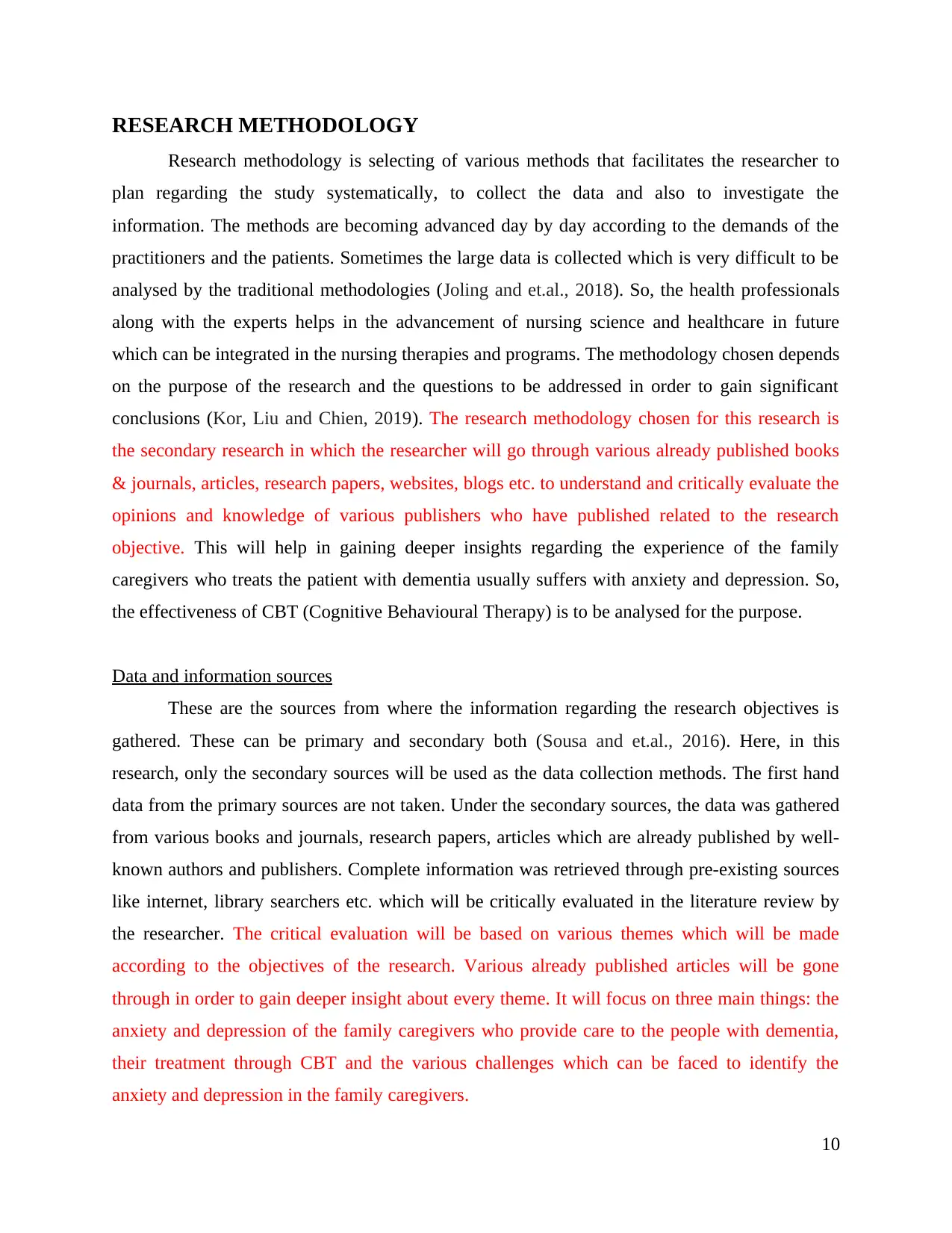
RESEARCH METHODOLOGY
Research methodology is selecting of various methods that facilitates the researcher to
plan regarding the study systematically, to collect the data and also to investigate the
information. The methods are becoming advanced day by day according to the demands of the
practitioners and the patients. Sometimes the large data is collected which is very difficult to be
analysed by the traditional methodologies (Joling and et.al., 2018). So, the health professionals
along with the experts helps in the advancement of nursing science and healthcare in future
which can be integrated in the nursing therapies and programs. The methodology chosen depends
on the purpose of the research and the questions to be addressed in order to gain significant
conclusions (Kor, Liu and Chien, 2019). The research methodology chosen for this research is
the secondary research in which the researcher will go through various already published books
& journals, articles, research papers, websites, blogs etc. to understand and critically evaluate the
opinions and knowledge of various publishers who have published related to the research
objective. This will help in gaining deeper insights regarding the experience of the family
caregivers who treats the patient with dementia usually suffers with anxiety and depression. So,
the effectiveness of CBT (Cognitive Behavioural Therapy) is to be analysed for the purpose.
Data and information sources
These are the sources from where the information regarding the research objectives is
gathered. These can be primary and secondary both (Sousa and et.al., 2016). Here, in this
research, only the secondary sources will be used as the data collection methods. The first hand
data from the primary sources are not taken. Under the secondary sources, the data was gathered
from various books and journals, research papers, articles which are already published by well-
known authors and publishers. Complete information was retrieved through pre-existing sources
like internet, library searchers etc. which will be critically evaluated in the literature review by
the researcher. The critical evaluation will be based on various themes which will be made
according to the objectives of the research. Various already published articles will be gone
through in order to gain deeper insight about every theme. It will focus on three main things: the
anxiety and depression of the family caregivers who provide care to the people with dementia,
their treatment through CBT and the various challenges which can be faced to identify the
anxiety and depression in the family caregivers.
10
Research methodology is selecting of various methods that facilitates the researcher to
plan regarding the study systematically, to collect the data and also to investigate the
information. The methods are becoming advanced day by day according to the demands of the
practitioners and the patients. Sometimes the large data is collected which is very difficult to be
analysed by the traditional methodologies (Joling and et.al., 2018). So, the health professionals
along with the experts helps in the advancement of nursing science and healthcare in future
which can be integrated in the nursing therapies and programs. The methodology chosen depends
on the purpose of the research and the questions to be addressed in order to gain significant
conclusions (Kor, Liu and Chien, 2019). The research methodology chosen for this research is
the secondary research in which the researcher will go through various already published books
& journals, articles, research papers, websites, blogs etc. to understand and critically evaluate the
opinions and knowledge of various publishers who have published related to the research
objective. This will help in gaining deeper insights regarding the experience of the family
caregivers who treats the patient with dementia usually suffers with anxiety and depression. So,
the effectiveness of CBT (Cognitive Behavioural Therapy) is to be analysed for the purpose.
Data and information sources
These are the sources from where the information regarding the research objectives is
gathered. These can be primary and secondary both (Sousa and et.al., 2016). Here, in this
research, only the secondary sources will be used as the data collection methods. The first hand
data from the primary sources are not taken. Under the secondary sources, the data was gathered
from various books and journals, research papers, articles which are already published by well-
known authors and publishers. Complete information was retrieved through pre-existing sources
like internet, library searchers etc. which will be critically evaluated in the literature review by
the researcher. The critical evaluation will be based on various themes which will be made
according to the objectives of the research. Various already published articles will be gone
through in order to gain deeper insight about every theme. It will focus on three main things: the
anxiety and depression of the family caregivers who provide care to the people with dementia,
their treatment through CBT and the various challenges which can be faced to identify the
anxiety and depression in the family caregivers.
10
Paraphrase This Document
Need a fresh take? Get an instant paraphrase of this document with our AI Paraphraser
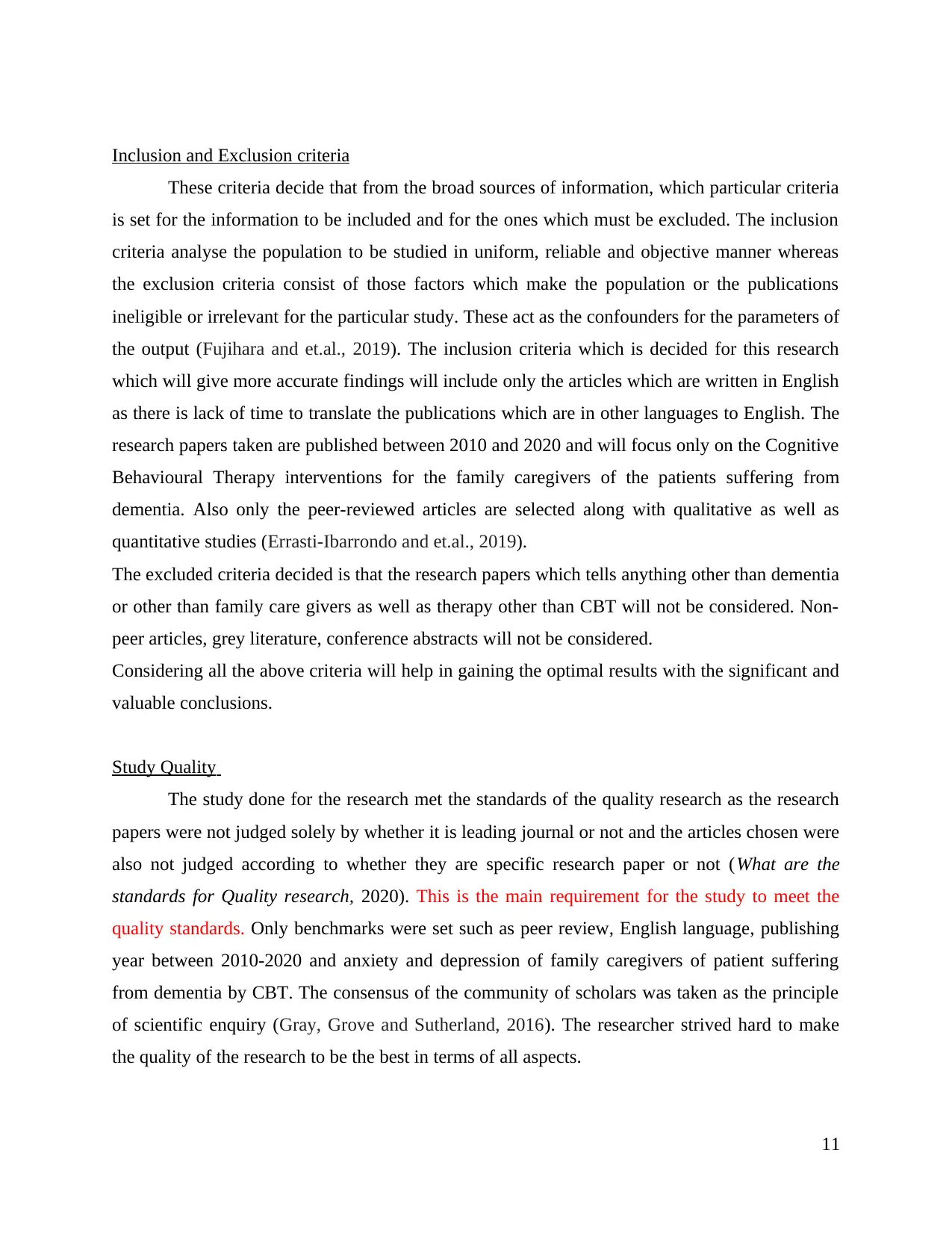
Inclusion and Exclusion criteria
These criteria decide that from the broad sources of information, which particular criteria
is set for the information to be included and for the ones which must be excluded. The inclusion
criteria analyse the population to be studied in uniform, reliable and objective manner whereas
the exclusion criteria consist of those factors which make the population or the publications
ineligible or irrelevant for the particular study. These act as the confounders for the parameters of
the output (Fujihara and et.al., 2019). The inclusion criteria which is decided for this research
which will give more accurate findings will include only the articles which are written in English
as there is lack of time to translate the publications which are in other languages to English. The
research papers taken are published between 2010 and 2020 and will focus only on the Cognitive
Behavioural Therapy interventions for the family caregivers of the patients suffering from
dementia. Also only the peer-reviewed articles are selected along with qualitative as well as
quantitative studies (Errasti‐Ibarrondo and et.al., 2019).
The excluded criteria decided is that the research papers which tells anything other than dementia
or other than family care givers as well as therapy other than CBT will not be considered. Non-
peer articles, grey literature, conference abstracts will not be considered.
Considering all the above criteria will help in gaining the optimal results with the significant and
valuable conclusions.
Study Quality
The study done for the research met the standards of the quality research as the research
papers were not judged solely by whether it is leading journal or not and the articles chosen were
also not judged according to whether they are specific research paper or not (What are the
standards for Quality research, 2020). This is the main requirement for the study to meet the
quality standards. Only benchmarks were set such as peer review, English language, publishing
year between 2010-2020 and anxiety and depression of family caregivers of patient suffering
from dementia by CBT. The consensus of the community of scholars was taken as the principle
of scientific enquiry (Gray, Grove and Sutherland, 2016). The researcher strived hard to make
the quality of the research to be the best in terms of all aspects.
11
These criteria decide that from the broad sources of information, which particular criteria
is set for the information to be included and for the ones which must be excluded. The inclusion
criteria analyse the population to be studied in uniform, reliable and objective manner whereas
the exclusion criteria consist of those factors which make the population or the publications
ineligible or irrelevant for the particular study. These act as the confounders for the parameters of
the output (Fujihara and et.al., 2019). The inclusion criteria which is decided for this research
which will give more accurate findings will include only the articles which are written in English
as there is lack of time to translate the publications which are in other languages to English. The
research papers taken are published between 2010 and 2020 and will focus only on the Cognitive
Behavioural Therapy interventions for the family caregivers of the patients suffering from
dementia. Also only the peer-reviewed articles are selected along with qualitative as well as
quantitative studies (Errasti‐Ibarrondo and et.al., 2019).
The excluded criteria decided is that the research papers which tells anything other than dementia
or other than family care givers as well as therapy other than CBT will not be considered. Non-
peer articles, grey literature, conference abstracts will not be considered.
Considering all the above criteria will help in gaining the optimal results with the significant and
valuable conclusions.
Study Quality
The study done for the research met the standards of the quality research as the research
papers were not judged solely by whether it is leading journal or not and the articles chosen were
also not judged according to whether they are specific research paper or not (What are the
standards for Quality research, 2020). This is the main requirement for the study to meet the
quality standards. Only benchmarks were set such as peer review, English language, publishing
year between 2010-2020 and anxiety and depression of family caregivers of patient suffering
from dementia by CBT. The consensus of the community of scholars was taken as the principle
of scientific enquiry (Gray, Grove and Sutherland, 2016). The researcher strived hard to make
the quality of the research to be the best in terms of all aspects.
11
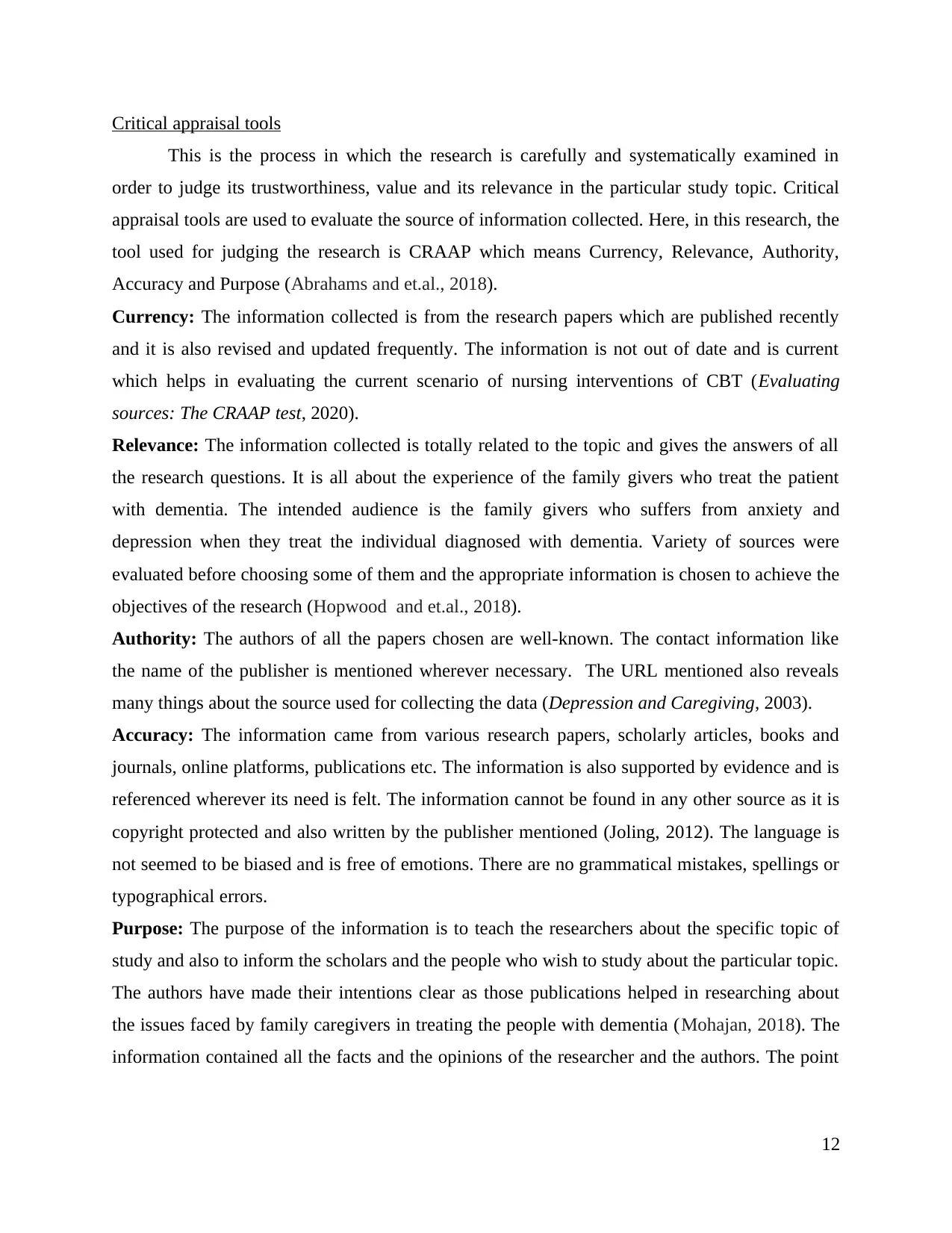
Critical appraisal tools
This is the process in which the research is carefully and systematically examined in
order to judge its trustworthiness, value and its relevance in the particular study topic. Critical
appraisal tools are used to evaluate the source of information collected. Here, in this research, the
tool used for judging the research is CRAAP which means Currency, Relevance, Authority,
Accuracy and Purpose (Abrahams and et.al., 2018).
Currency: The information collected is from the research papers which are published recently
and it is also revised and updated frequently. The information is not out of date and is current
which helps in evaluating the current scenario of nursing interventions of CBT (Evaluating
sources: The CRAAP test, 2020).
Relevance: The information collected is totally related to the topic and gives the answers of all
the research questions. It is all about the experience of the family givers who treat the patient
with dementia. The intended audience is the family givers who suffers from anxiety and
depression when they treat the individual diagnosed with dementia. Variety of sources were
evaluated before choosing some of them and the appropriate information is chosen to achieve the
objectives of the research (Hopwood and et.al., 2018).
Authority: The authors of all the papers chosen are well-known. The contact information like
the name of the publisher is mentioned wherever necessary. The URL mentioned also reveals
many things about the source used for collecting the data (Depression and Caregiving, 2003).
Accuracy: The information came from various research papers, scholarly articles, books and
journals, online platforms, publications etc. The information is also supported by evidence and is
referenced wherever its need is felt. The information cannot be found in any other source as it is
copyright protected and also written by the publisher mentioned (Joling, 2012). The language is
not seemed to be biased and is free of emotions. There are no grammatical mistakes, spellings or
typographical errors.
Purpose: The purpose of the information is to teach the researchers about the specific topic of
study and also to inform the scholars and the people who wish to study about the particular topic.
The authors have made their intentions clear as those publications helped in researching about
the issues faced by family caregivers in treating the people with dementia (Mohajan, 2018). The
information contained all the facts and the opinions of the researcher and the authors. The point
12
This is the process in which the research is carefully and systematically examined in
order to judge its trustworthiness, value and its relevance in the particular study topic. Critical
appraisal tools are used to evaluate the source of information collected. Here, in this research, the
tool used for judging the research is CRAAP which means Currency, Relevance, Authority,
Accuracy and Purpose (Abrahams and et.al., 2018).
Currency: The information collected is from the research papers which are published recently
and it is also revised and updated frequently. The information is not out of date and is current
which helps in evaluating the current scenario of nursing interventions of CBT (Evaluating
sources: The CRAAP test, 2020).
Relevance: The information collected is totally related to the topic and gives the answers of all
the research questions. It is all about the experience of the family givers who treat the patient
with dementia. The intended audience is the family givers who suffers from anxiety and
depression when they treat the individual diagnosed with dementia. Variety of sources were
evaluated before choosing some of them and the appropriate information is chosen to achieve the
objectives of the research (Hopwood and et.al., 2018).
Authority: The authors of all the papers chosen are well-known. The contact information like
the name of the publisher is mentioned wherever necessary. The URL mentioned also reveals
many things about the source used for collecting the data (Depression and Caregiving, 2003).
Accuracy: The information came from various research papers, scholarly articles, books and
journals, online platforms, publications etc. The information is also supported by evidence and is
referenced wherever its need is felt. The information cannot be found in any other source as it is
copyright protected and also written by the publisher mentioned (Joling, 2012). The language is
not seemed to be biased and is free of emotions. There are no grammatical mistakes, spellings or
typographical errors.
Purpose: The purpose of the information is to teach the researchers about the specific topic of
study and also to inform the scholars and the people who wish to study about the particular topic.
The authors have made their intentions clear as those publications helped in researching about
the issues faced by family caregivers in treating the people with dementia (Mohajan, 2018). The
information contained all the facts and the opinions of the researcher and the authors. The point
12
⊘ This is a preview!⊘
Do you want full access?
Subscribe today to unlock all pages.

Trusted by 1+ million students worldwide
1 out of 23
Related Documents
Your All-in-One AI-Powered Toolkit for Academic Success.
+13062052269
info@desklib.com
Available 24*7 on WhatsApp / Email
![[object Object]](/_next/static/media/star-bottom.7253800d.svg)
Unlock your academic potential
Copyright © 2020–2026 A2Z Services. All Rights Reserved. Developed and managed by ZUCOL.




